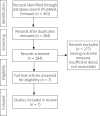Need for repeat revascularisation in hybrid coronary revascularisation vs. percutaneous coronary intervention
- PMID: 39022704
- PMCID: PMC11249877
- DOI: 10.5114/aic.2024.140903
Need for repeat revascularisation in hybrid coronary revascularisation vs. percutaneous coronary intervention
Abstract
Hybrid coronary revascularisation (HCR), being a treatment path combining both coronary artery bypass grafting and percutaneous coronary intervention (PCI) approaches, offers the advantages of both methods in patients with multi-vessel coronary artery disease. Since available literature provides few studies comparing the need for repeat revascularisation (RR) after HCR in comparison to PCI, our review aimed at summarising the latest data on this topic from the last 5 years (2018-2023). The search was conducted within the PubMed and Embase databases, followed by application of inclusion and exclusion criteria and providing a summary of data and characteristics of eligible studies. On the basis of 7 records included in the final analysis, RR and/or follow-up target vessel revascularisation (TVR) were significantly less frequently required in the case of HCR than in PCI in 3 out of 7 records, whereas the remaining four provided no significant differences in analysed rates between the 2 therapeutic pathways. When it comes to lowering the necessity for follow-up TVR and/or RR in a fraction of instances, HCR demonstrates a significant advantage over PCI. The complexity of outcomes associated with these therapies is emphasised by the fact that no statistically significant differences were observed between the 2 methods in the remaining 4 records.
Keywords: hybrid coronary revascularisation; percutaneous coronary intervention; repeat revascularisation.
Copyright: © 2024 Termedia Sp. z o. o.
Conflict of interest statement
The authors declare no conflict of interest.
References
-
- McKiernan M, Halkos ME. Hybrid coronary revascularization: are we there yet? Curr Opin Cardiol 2020; 35: 673-8. - PubMed
-
- Kiaii B, Teefy P. Hybrid coronary artery revascularization: a review and current evidence. Innovations (Phila) 2019; 14: 394-404. - PubMed
-
- Saha T, Naqvi SY, Goldberg S. Hybrid revascularization: a review. Cardiology 2018; 140: 35-44. - PubMed
-
- Ganyukov V, Kochergin N, Shilov A, et al. . Randomized clinical trial of surgical vs. percutaneous vs. hybrid revascularization in multivessel coronary artery disease: residual myocardial ischemia and clinical outcomes at one year-Hybrid coronary REvascularization Versus Stenting or Surgery (HREVS). J Interv Cardiol 2020; 2020: 5458064. - PMC - PubMed
Publication types
LinkOut - more resources
Full Text Sources
Miscellaneous

